Meridonian Air Forces: Difference between revisions
No edit summary |
No edit summary |
||
| (7 intermediate revisions by the same user not shown) | |||
| Line 31: | Line 31: | ||
|website = | |website = | ||
<!-- Commanders --> | <!-- Commanders --> | ||
|commander1 = [[ | |commander1 = [[Yui Townley]] | ||
|commander1_label = [[President of Meridon|Commander-in-Chief]] | |commander1_label = [[President of Meridon|Commander-in-Chief]] | ||
|commander2 = [[Jason Merritt]] | |commander2 = [[Jason Merritt]] | ||
| Line 37: | Line 37: | ||
|commander3 = Thomas Standley | |commander3 = Thomas Standley | ||
|commander3_label = Air Forces Secretary | |commander3_label = Air Forces Secretary | ||
|commander4 = | |commander4 = ADM Benjamin Collins | ||
|commander4_label = Chief of Defense Staff | |commander4_label = Chief of Defense Staff | ||
|commander5 = ACDT Matthew Rodney | |commander5 = ACDT Matthew Rodney | ||
| Line 57: | Line 57: | ||
}}The '''Meridonian Air Forces''' are the aerial warfare component of the [[Meridon Defense Forces]]. It is composed of 34,619 active duty airmen, and about 10,000 reservists as of 2022. It operates a number of aircraft, making it the number largest airforce in the world. | }}The '''Meridonian Air Forces''' are the aerial warfare component of the [[Meridon Defense Forces]]. It is composed of 34,619 active duty airmen, and about 10,000 reservists as of 2022. It operates a number of aircraft, making it the number largest airforce in the world. | ||
The Meridonian Air Forces were formed in 1922 as the '''Meridonian Flying Corps''', and organized as a special branch subordinate to the Army. Shortly prior to the [[ | The Meridonian Air Forces were formed in 1922 as the '''Meridonian Flying Corps''', and organized as a special branch subordinate to the Army. Shortly prior to the [[Great War (Esvanovia)|Great War]], it was reorganized as the Meridonian Air Forces and properly constituted as a separate branch, being one of the first branches worldwide to do so. It, alongside the [[Meridonian Army|Army]] and [[Meridonian Navy|Navy]], were subordinated to the [[Meridonian Defense Forces]] and the [[Defense Department (Meridon)|Defense Department]] following the conclusion of the war. | ||
The Air Force in the modern day is a fully professional service arm. The Air Forces and the earlier Flying Corps were unique in never enacting conscription, remaining a fully professional force throughout the entirety of its existence. Today, the Air Force is a highly developed and capable aerial force that fields fighter and strike aircraft, a large variety of transport aircraft, surveilliance, reconnaissance, intelligence, control and sustainment aircraft. The Air Forces are administered by the [[Department of the Air Forces (Meridon)|Department of the Air Forces]] as a civilian oversight, however it is commanded by the [[Chief of Air Force Staff (Meridon)|Chief of Air Force Staff]], who holds the rank of Air Commandant and is the seniormost commissioned officer in the Service. The Air Force regularly participates in international activities including training exercises, peacekeeping, and humanitarian aid missions. | The Air Force in the modern day is a fully professional service arm. The Air Forces and the earlier Flying Corps were unique in never enacting conscription, remaining a fully professional force throughout the entirety of its existence. Today, the Air Force is a highly developed and capable aerial force that fields fighter and strike aircraft, a large variety of transport aircraft, surveilliance, reconnaissance, intelligence, control and sustainment aircraft. The Air Forces are administered by the [[Department of the Air Forces (Meridon)|Department of the Air Forces]] as a civilian oversight, however it is commanded by the [[Chief of Air Force Staff (Meridon)|Chief of Air Force Staff]], who holds the rank of Air Commandant and is the seniormost commissioned officer in the Service. The Air Force regularly participates in international activities including training exercises, peacekeeping, and humanitarian aid missions. | ||
| Line 80: | Line 80: | ||
===Structure=== | ===Structure=== | ||
''See also: [[ | ''See also: [[Structure of the Meridonian Air Forces]]''<br> | ||
<br> | |||
*Air Forces Special Forces Group (AFSFG) | *Air Forces Special Forces Group (AFSFG) | ||
| Line 186: | Line 164: | ||
*[[Meridon Defense Forces]] | *[[Meridon Defense Forces]] | ||
*[[Modern equipment of the Meridonian Air Forces]] | *[[Modern equipment of the Meridonian Air Forces]] | ||
{{Template:MeridonTopics}} | {{Template:MeridonTopics}} | ||
{{MeridonDefenseForce}} | {{MeridonDefenseForce}} | ||
[[Category:Meridon]] | [[Category:Meridon]] | ||
[[Category:Meridonian military]] | [[Category:Meridonian military]] | ||
Latest revision as of 14:07, 7 April 2024
| Meridonian Air Forces | |
|---|---|
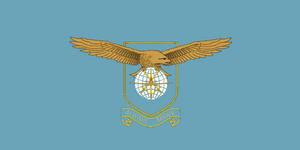 Service flag of the Meridonian Air Forces | |
| Active | 10 July 1931 - present |
| Country | |
| Type | Air force |
| Role | Air warfare Airlift Intelligence, surveillance, reconnaissance |
| Size | 34,619 |
| Part of | |
| Ceremonial Garrison | MAB Constance, Cordelia |
| Motto(s) | Always Above |
| Colors | Aerial Blue, Solar Gold |
| March | TBD |
| Engagements | Second Escar-Varunan War |
| Commanders | |
| Commander-in-Chief | Yui Townley |
| Defense Secretary | Jason Merritt |
| Air Forces Secretary | Thomas Standley |
| Chief of Defense Staff | ADM Benjamin Collins |
| Chief of Air Forces Staff | ACDT Matthew Rodney |
| Vice Chief of Air Forces Staff | AVCd Joseph Tataio |
| Warrant Officer of the Air Forces | WOC1 Tony Ribaldo |
| Insignia | |
| Service badge | |
| Aircraft roundel |  |
| Alternate low-vis roundel |  |
The Meridonian Air Forces are the aerial warfare component of the Meridon Defense Forces. It is composed of 34,619 active duty airmen, and about 10,000 reservists as of 2022. It operates a number of aircraft, making it the number largest airforce in the world.
The Meridonian Air Forces were formed in 1922 as the Meridonian Flying Corps, and organized as a special branch subordinate to the Army. Shortly prior to the Great War, it was reorganized as the Meridonian Air Forces and properly constituted as a separate branch, being one of the first branches worldwide to do so. It, alongside the Army and Navy, were subordinated to the Meridonian Defense Forces and the Defense Department following the conclusion of the war.
The Air Force in the modern day is a fully professional service arm. The Air Forces and the earlier Flying Corps were unique in never enacting conscription, remaining a fully professional force throughout the entirety of its existence. Today, the Air Force is a highly developed and capable aerial force that fields fighter and strike aircraft, a large variety of transport aircraft, surveilliance, reconnaissance, intelligence, control and sustainment aircraft. The Air Forces are administered by the Department of the Air Forces as a civilian oversight, however it is commanded by the Chief of Air Force Staff, who holds the rank of Air Commandant and is the seniormost commissioned officer in the Service. The Air Force regularly participates in international activities including training exercises, peacekeeping, and humanitarian aid missions.
History
Early Iterations
Formation
2nd Escar-Varunan War
Post-war
Modern day
Organization
The Air Forces consist of two components- Regular and Reserve. Regular formations compose the active-duty formations of the Navy and comprise the majority of its strength. Reserve formations consist of both part time sailors and lower readiness formations and units that are generally relegated to defense support activities on an as-needed basis. Reserve airmen, at a minimum, conduct training two days per month with their formation, and will conduct additional training as is required by their profession
The Air Forces are headed by the Chief of Air Force Staff, the highest-ranking commissioned officer in the Navy, who sits on the Defense General Staff as its seniormost representative. The COAFS reports to the Air Forces Secretary, who reports to the Defense Secretary, who primarily advises the President of Meridon on all defense matters and is responsible for implementing civilian policy into the Navy.
Structure
See also: Structure of the Meridonian Air Forces
- Air Forces Special Forces Group (AFSFG)
Special operations forces
See also:Special Operations Forces Command
Special warfare forces are organized under the Air Forces Special Forces Group (AFSFG), which regularly interoperates and reports to Special Operations Forces Command (SOFCOM). NSFG consists of a number of tenant special forces unit.
Equipment
See also:Modern equipment of the Meridonian Air Forces
Uniforms
Personnel
See also:Military ranks of the Meridon Defense Forces#Meridonian Air Forces
Commissioned officers
| DD Pay Grade | OF11 | OF10 | OF9 | OF8 | OF7 | OF6 | OF5 | OF4 | OF3 | OF2 | OF1 | OFC |
|---|---|---|---|---|---|---|---|---|---|---|---|---|
Air Forces |
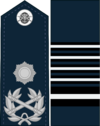
|
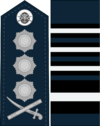
|
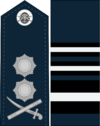
|
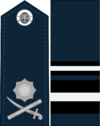
|
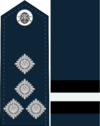
|
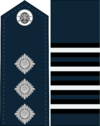
|
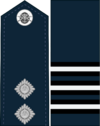
|
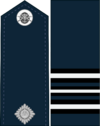
|
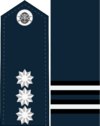
|
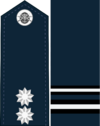
|

|
Various |
| Rank title | Air Marshal | Air Commandant | Air Vice Commandant | Air Lieutenant Commandant | Air Commodore | Colonel | Lieutenant Colonel | Major | Captain | Lieutenant | Second Lieutenant | Various |
| Abbrevation | AM | ACdt | AVCd | ALCd | ACdr | Col | LCol | Maj | Cpt | Ltn | 2Lt | Various |
Other ranks
| DD Pay Grade | WO1 | WO2 | WO3 | WO4 | WO5 | OR6 | OR5 | OR4 | OR3 | OR2 | OR1 | Recruit | |||
|---|---|---|---|---|---|---|---|---|---|---|---|---|---|---|---|
Air Forces |

|

|

|

|

|

|

|

|

|

|
No rank insignia | ||||
| Rank title | Warrant Officer Class 1 | Warrant Officer Class 2 | Not used | Not used | Not used | Staff Sergeant | Master Sergeant | Flight Sergeant | Technical Sergeant | Sergeant | Leading Airman | Senior Airman | Airman | Airman Recruit | |
| Abbrevation | WOC1 | WOC2 | SSgt | MSgt | FSgt | TSgt | Sgt | LAmn | SAmn | Amn | AmRct | ||||





